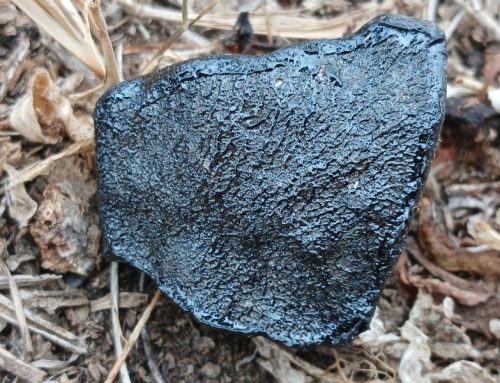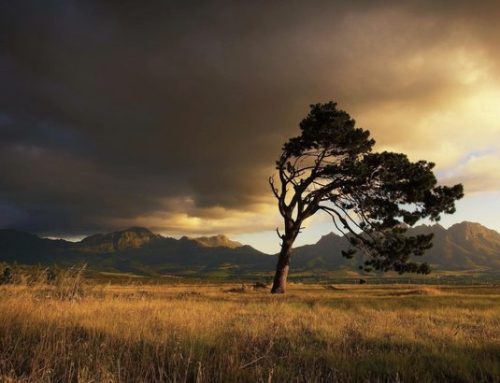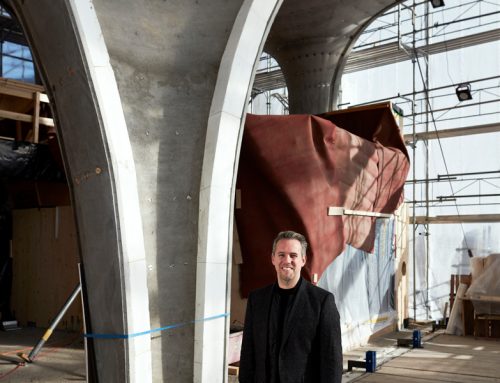
When we talk about shale gas mining and fracking, we are not talking about one little well in the middle of the Karoo. We are talking about 60% of South Africa’s land surface being targeted for production. In this feature we journey through almost three years of the shale gas controversy, and question whether this so-called game changer isn’t trapping South Africa in a global energy mirage that has already gone from Boom to Bust.
In January 2011 a group of farmers and community members gathered in the bowling club in the Karoo town of Hofmeyr where Shell held its first ever meeting to spell out their shale gas fracking plans. I was there.
Shell’s team extolled their own virtues, emphasising what good guys they are and what a clean environmental record they have. They spoke as if the Niger Delta and all the other Shell-shocked fallout zones in the world don’t exist.
With hindsight the farmers should have stopped the meeting right there and asked whether this was a declaration of war, given that shale gas mining threatens to destroy their livelihoods and the agricultural economy of the Karoo.
But it was only the first meeting and all the farmers wanted to know was:
What chemicals do you use in the fracking process?
Where will you source the millions upon millions of litres of water required for this process?
Is there are a risk of contaminating our water?
No one from Shell was prepared to respond to these basic concerns.
The Karoo farmers immediately felt uncomfortable, they felt the vastness of the shadow passing over them, and they were not wrong. They have since learnt that Shell and various other oil and gas companies are targeting 60% of South Africa’s land surface, starting with the Karoo.
Which is why global businessman Johann Rupert, who is from the Karoo, publicly warned Shell not to play Russian roulette with the Karoo and not to treat the people of Karoo like “hillbillies”. Yet still they do.
A string of oil and gas men
Since January 2011, farmers, landowners and community members of the Karoo – all shapes, sizes and colours – have been subjected to a string of oil and gas men telling them how shale gas mining is going to bring wealth and employment to the impoverished. To make sure everyone in South Africa gets to hear this, Shell’s team has been working overtime, including sending a string of journalists on cushy trips to the United States.
Of late, emissaries from Shell have once again started contacting Karoo farmer associations, municipalities and communities, requesting to meet with them. What for, is anyone’s guess, since almost three years later the people of the Karoo still don’t have any answers to their questions.
All they know is that Shell executives are well schooled in double speak. The same applies to all the other oil and gas companies targeting the Karoo.
A smooth-talking Hollander
“We won’t compete with the farmers’ water,” Shell’s Joburg-based Upstream General Manager, Jan Willem Eggink, has repeatedly stated. A smooth-talking Hollander he has spent tellingly little time in the Karoo yet he talks about the Karoo on TV as if he knows and loves it well.
For Eggink or Shell to state that it will not compete with the farmers’ water, sounds alarm bells from here to China (where Shell is already very busy drilling for shale gas and where they surely had a far easier time steamrolling the locals because active citizenry is not encouraged in that part of the world).
Why does it ring alarm bells?
Why does it ring alarm bells? Because we all know there are deepwater aquifers in the Karoo, situated below the level of the boreholes where farmers access their water. However, the system is interlinked and if Shell drills down to or fracks the deeper levels it could have a devastating leakage effect into the shallower levels, increasing the danger of ground and surface water contamination.
Drilling, like fracking, is not yet regulated in South Africa, and with or without fracking, it remains a highly invasive process because it will need to penetrate down to 4-5.5km and then horizontally to approximately 2.5km to access the shale gas which is speculated to be there.
Representing thousands of Karoo people
“This is massively deep drilling for which there is no experience in South Africa where shale gas mining has never been done. Contamination can occur from the deep drilling process alone,” explains attorney Derek Light who is based in Graaff-Reinet and who is representing thousands of farmers, landowners and communities within the 220 000 sq kms of the Karoo that Shell and other oil and gas companies, are targeting. The other companies include Shell, Sasol, Bundu and Falcon.
Mandated by the people he is representing, and including generous support from Johann Rupert, Light is heading a team of independent specialists from South Africa and the United States, including advocates, engineers, mining specialists and environmental and water specialists, to get to the bottom of the implications of shale gas exploration and extraction in the Karoo and other parts of South Africa.
Shale gas could be depleted in 4 – 30 years
“There are so many questions we need to address,” says Light. “If, for example, as the government’s task team report on shale gas mining concludes, the resource will be depleted in 20-30 years, but it could be as little as 4 years, then what is the sense of going to the excessive expense of mining shale gas, which is another fossil fuel, when we have coal reserves for 200-300 years?”
It is also completely misleading to say that shale gas has a lighter carbon footprint than coal given that the carbon footprint of the full production cycle of shale gas will invariably exceed that of coal.
“We also need to look at the two contradictory reports published by government regarding the projected reserves of shale gas in South Africa,” says Light.
From 485 trillion to 40 trillion cubic feet
“The Minister of Mineral Resources first said they estimate that South Africa has 485 trillion cubic feet of shale gas. The Petroleum Agency South Africa (PASA) then corrected this and said it was probably closer to 40 trillion cubic feet. That’s quite a difference.”
PASA promotes exploration for onshore and offshore oil and gas resources and their optimal development on behalf of government.
How can President Zuma call it a game changer?
“The point is that we do not know how much shale gas there is, so how can President Jacob Zuma stand up and call the industry a game changer?” questions Light.
“To understand the rashness of this statement we need look no further than the current global oversupply of natural gas (which includes shale gas). The price plummeted from US$13.50 to US$2.50 per 1000 cubic feet, and is currently at around US$3.50, whereas it costs US$4.50 to produce this amount.
“Clearly, the shale gas industry is floundering. Clearly, the hype over the so-called shale gas boom, which has led to predictions of potentially huge financial and energy gains for South Africa, is just that – hype.”
Boom in 2009 to bust in 2013
Even President Barack Obama got it wrong. In 2011 he said the shale gas industry would be a ‘game changer’ but the opposite happened. The game changer went from boom in 2009 to bust in 2013.
Warnings about the hype come from Shell’s own Executive Director, Matthias Bischel. In an article in the Financial Post in the United States, 18 October 2013 issue, he said:
“It is very dangerous when we hype things, because it sets expectation which perhaps can’t be fulfilled to the degree that you would like. I’m afraid that some countries may be setting themselves up for dashed expectations. Take Poland for instance, where a number of operators have announced they are pulling out.”
Shell itself is experiencing a rapid decline in the profitability of its shale gas investments in the United States and has sold several of its assets. It is said to have taken a two billion dollar write-down in the value of its North American shale assets, including leases in Pennsylvania.
“Shell has since announced it is shifting its focus from natural gas to shale oil, with its executive saying that finding the trapped oil is also harder than the company thought,” adds Light.
Pulling out and leaving the damage behind
Large oil and gas companies like Chesapeake that flooded Pennsylvania when the natural gas price was at US$13 per 1000 cubic feet, are also pulling out. The massive costs of producing shale gas have far exceeded the financial benefit. From approximately 100 000 shale gas wells, there are only about 50 still operating in Pennsylvania today. Regrettably, the damage they have done to rural livelihoods, water resources and the environment is there forever.
Which is why we need to deeply question the sustainability and appropriateness of shale gas exploitation here in South Africa, given all the warnings about the ‘boom-to-bust’ economy. Shell South Africa, and the other players in the South African shale gas industry, have all dismissed these concerns but it is now apparent that they are not misplaced.
Why continue to create the expectation?
The question that now needs to be answered by Shell is why they continue to create the expectation of huge financial benefit to this country when their own experience in the United States proves the contrary.
“Surely it cannot be argued that there is benefit to any country in allowing the exploitation of its natural resources when the boom-to-bust experience may span a period of as little as four years,” says Light.
“How can this even be considered as economically viable, especially given the substantial challenges of exploiting South Africa’s reserves, including the depth of the gas and the lack of existing infrastructure? Does it not make sense to rather buy into the massive finds off countries like Mozambique, and import the gas we need?”
The Karoo produces 50% of SA’s red meat
Another critical area to assess is the impact on the Karoo’s agricultural economy given that the Eastern Cape region of the Karoo produces over 30% of the red meat in this country. Add the Western and Northern Cape regions of the Karoo and it goes up to approximately 50% of the country’s red meat production. The percentage of natural fibre the Karoo produces (notably wool and mohair) is even higher.
Yet the Environmental Management Plan (EMP) that Shell submitted as part of its exploration application, describes the Karoo as an arid region with little agricultural merit. Regrettably, the report produced by the Minister’s task team similarly reflects a complete lack of appreciation of the valuable contribution of agriculture in the Karoo, including its role as a substantial employment provider.
Alarming lack of detail and research
From start to finish Shell’s EMP, which was produced by environmental consultancy Golder Associates, reveals an alarming lack of detail and research, as Fritz Bekker, the environmental consultant commissioned by Light as part of the team that formally responded to Shell’s EMP, attests:
“It is my opinion that Shell’s EMP does not comply with any of the requirements of the Mineral and Petroleum Resources Development Act (MPRDA). In doing so, they’ve attempted to bypass legislation that exists to protect the people of South Africa, as enshrined in Chapter Two of our Constitution.”
Yet a senior scientist at Golder Associates, Dr Brent Baxter, signed it off.
It is up to South Africa to make sure that oil and gas companies comply with our legislation and that the necessary amendments to the mining-related laws are put in place to prevent companies from thinking they can present EMPs that are simply not good enough.
Substantial financial security
“For example, the law needs to ensure that substantial financial security is provided for a mining proposal of this kind, and the financial security needs to apply for a meaningful period of 100 years so that you don’t have companies pushing off and burdening the South African taxpayer with cleaning up the mess years down the line,” says Light.
“We also have to imagine what multi-well pads with 32 wells per pad, serviced by an average of 1400 trucks per drilling activity per well would look like and what the impact would be on the Karoo’s water resources and agri-environment, because this is what Shell is proposing.”
Shell has stated that it would need 1-hectare per well pad because any area larger than 1-hectare automatically requires an Environmental Impact Assessment (EIA). In reality, each 32-well pad might well need 3-4-hectares.
Toxic fracking waste flowback, heavy metals, impurities
What is also far too unclear is how they would deal with the vast quantities of drilling mud, drilling cuttings, toxic fracking waste flowback and produced water containing heavy metals and a variety of impurities.
The South African government has, to its credit, acknowledged the concerns Light and his team have raised, many of which were in response to Shell’s EMP. Concerns raised include the potential dangers of fracking as a production method, potential water, air and dust pollution, possible impacts of radioactive materials, socio-economics impacts…the list goes on.
“Accordingly, we have written to both the former and current Minister of Mineral Resources, and recommended that they do not grant the five pending shale gas exploration applications on the grounds that there are far too many unknowns for it to be prudent,” continues Light.
“In applying the necessary ‘precautionary principle’, government must take into account the limits of knowledge and if this mitigates against taking an informed decision, then they cannot take a legally defensible decision i.e. they should not allow the process to continue until the lack of knowledge has been augmented by further research.
“We advised that a Strategic Environmental Assessment by the government be undertaken before any decisions are made. This is crucial because as the law in South Africa currently stands, if the Minister grants an exploration right she must grant the production right when applied for as well.”
No response from the Minister
Neither the former nor the current Minister has responded. The Department of Mineral Resources has also announced that they will be holding public consultations with the people of the Karoo on several occasions, all of which have been cancelled by them at very short notice.
Light’s correspondence to the current Minister requesting whether they intend to hold these consultations, and when they might be, has received no response.
Regrettably the government has also decided against a Strategic Environmental Assessment.
“They have erred in our view. The precautionary rule, enshrined in the principles contained in Section 2 of the National Environmental Management Act (NEMA), applies to the exploration process. It will be extremely difficult to stop the process once it has started, at which stage the people of this country might well be led on a legal dance we cannot afford,” explains Light.
New requirements
With the implementation of the 2009 MPRDA Amendment Act, exploration licenses cannot be granted until the Minister of Mineral Resources has granted the requisite environmental authorisations. The required environmental authorisations are the listed activities in NEMA and from 7 December 2014 will include a number of new listed activities applicable to the mining industry.
“This is a positive development as it will require of Shell and others to conduct a whole new notice and consultation process involving landowners and interested and affected parties in the conduct of comprehensive Environmental Impact Assessments (EIAs) by Shell and others. The Minister of Mineral Resources cannot, as published in the media, simply grant licenses once the new regulations for fracking are introduced.”
If and when environmental authorisations are granted and licenses issued, those aggrieved by them can then pursue an appeal to the Minister of Environmental Affairs, which will have the effect of suspending any authorisations or licenses issued. The latter provision came into effect in September 2014.
We shall consider a legal challenge
“In addition to this, in the event that the new regulations do not comply with the constitutional requirements of legality, for example, the regulations around fracking in the amendment, we shall consider a collective legal challenge to these in an appropriate forum to have them declared invalid,” he continues.
“In the event that environmental authorisations are granted and licenses issued, we shall lodge an Appeal, the effect of which will be to suspend the licenses and related exploration activities until such time as the Appeal is heard.
“What we have on our side is good law. We are fortunate to have one of the best legal systems in the world.”
Further developments expected
Further developments are imminent, continues Light.
“It is anticipated that the government’s substantial amendments to the Mineral and Petroleum Resources Development (MPRDA) Act 28 of 2002 (as amended), approved in March 2014 without the correct processes being followed, may be published soon.
“The legal position now is that there is a state of complete confusion, and this time round the government’s proposed amendments are causing as much consternation for the mining industry as they have for the people of the Karoo.”
A major ruckus in the mining industry
One of the amendments, approved in March 2014, shortly before the general elections, has caused a major ruckus in the mining industry as it provides for government to be entitled to 20% of net profits (a so-called ‘free carried interest’) and to have first call on the remaining 80%.
“This impacts negatively on the mining industry and may lead to disinvestment,” says Light.
Irresponsible to call it a game changer
In the meantime South Africa has to remain extremely circumspect when comments are made that shale gas is a game changer that will sort out our energy requirements.
“Firstly, the so-called game changer has proved to be the opposite in the United States,” explains Light.
“Secondly, it is highly irresponsible to call it a game changer for South Africa when the potential harm it can cause to the economy and the environment has not been adequately addressed by those in power.
“And, thirdly, it is simply disingenuous to claim it’s a game changer when the projections are so astonishingly unreliable.”




